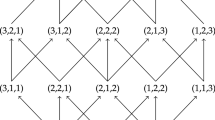Abstract
The case that attributes have a single value is considered in the classical formal concept. However, real-life data involve multi-level attribute values, which means that attributes have different values on different scales. In order to deal with multi-level attributes, we introduce the concept of multi-scale formal context in this paper. In this context, with the change of scale, objects owned by each attribute change monotonously. Thus, under the multi-scale formal context, the change of formal concept is discussed. Moreover, this paper defines the consistent multi-scale formal decision context and discusses the optimal scale selection problem of the consistent multi-scale decision context.
Similar content being viewed by others
Explore related subjects
Discover the latest articles, news and stories from top researchers in related subjects.References
Belohlavek R, Vychodil V (2010) Discovery of optimal factors in binary data via a novel method of matrix decomposition. J Comput Syst Sci 76(1):3–20
Belohlavek R, Baets BD, Konecny J (2014) Granularity of attributes in formal concept analysis. Inf Sci 260(1):149–170
Cornejo ME, Medina J, Ramírez-Poussa E (2018) Characterizing reducts in multi-adjoint concept lattices. Inf Sci 422:364–376
De Maio C, Fenza G, Gallo M et al (2014) Formal and relational concept analysis for fuzzy-based automatic semantic annotation. Appl intell 40(1):154–177
Fenza G, Loia V, Senatore S (2008) Concept mining of semantic web services by means of extended fuzzy formal concept analysis (FFCA). In: 2008 IEEE International Conference on Systems, Man and Cybernetics. IEEE, pp240–245
Formica A (2019) Similarity reasoning in formal concept analysis: from one-to many-valued contexts. Knowl Inf Syst 60(2):715–739
Ganter B (1999) Attribute exploration with background knowledge. Theoret Comput Sci 217(2):215–233
Ganter B, Wille R (2012) Formal concept analysis: mathematical foundations. Springer, Berlin
Hao C, Fan M, Li JH et al (2016) Optimal scale selection in multi-scale contexts based on granular scale rules. Pattern Recognit Artif Intell 29(3):272–280
Li F, Hu BQ, Wang J (2017) Stepwise optimal scale selection for multi-scale decision tables via attribute significance. Knowl Base d Syst 129:4–16
Li JJ, Li KD, Wu DG (2013) Knowledge system model based on rough set and concept lattice. Science Press, Beijing
Liang MS, Mi JS, Feng T (2019) Optimal granulation selection for multi-label data based on multi-granulation rough sets. Granul Comput 4:323–335
Liu C, Miao D, Qian J (2014) On multi-granulation covering rough sets. Int J Approx Reason 55(6):1404–1418
Pawlak Z (1982) Rough sets. Int J Comput Inform Sci 11(5):341–356
Pawlak Z (1991) Rough Sets: theoretical aspects of reasoning about data. Kluwer Academic Publishers, Dordrecht
Rouane-Hacene M, Huchard M, Napoli A et al (2013) Relational concept analysis: mining concept lattices from multi-relational data. Ann Math Artif Intell 67(1):81–108
Shao MW, Lv MM, Li KW, Wang CZ (2019) The construction of attribute (object)-oriented multi-granularity concept lattices. Int J Mach Learn Cybern. https://doi.org/10.1007/s13042-019-00955-0
She Y, He X, Qian T, Wang Q, Zeng W (2019) A theoretical study on object-oriented and property-oriented multi-scale formal concept analysis. Int J Mach Learn Cybern 10(11):3263–3271
Sumangali K, Kumar CA (2019) Concept lattice simplification in formal concept analysis using attribute clustering. J Ambient Intell Hum Comput 10:2327–2343
Wei L, Qi JJ, Zhang WX (2008) Attribute reduction of concept lattices in formal decision context. Sci China Ser E Inf Sci 38(2):195–208
Wille R (1982) Restructuring lattice theory: an approach based on hierarchy of concepts. In: Rival I (ed) Ordered sets. Reidel, Boston, 445–470. https://doi.org/10.1007/978-94-009-7798-3_15
Wille R (2005) Formal concept analysis as mathematical theory of concepts and concept hierarchies. Formal concept analysis. Springer, Berlin, Heidelberg, pp 1–33
Wu WZ, Leung Y, Mi JS (2009) Granular computing and knowledge reduction in formal contexts. IEEE Trans Knowl Data Eng 21(10):1461–1474
Wu WZ, Leung Y (2011) Theory and applications of granular labelled partitions in multi-scale decision tables. Inf Sci 181(18):3878–3897
Wu WZ, Leung Y (2013) Optimal scale selection for multi-scale decision tables. Int J Approx Reason 54(8):1107–1129
Wu WZ, Yang L, Tan AH, Xu YH (2018) Granularity selections in generalized incomplete multi-granular labeled decision systems. J Comput Res Dev 55(6):1263–1272
Xie J, Yang M, Li JH, Zheng Z (2018) Rule acquisition and optimal scale selection in multi-scale formal decision contexts and their applications to smart city. Future Gener Comput Syst 83:564–581
Yao YY (1999) Stratfied rough sets and granular computing. In: Dave R, Sudkamp T (eds) Proceedings of the 18th International Conference of the North American Fuzzy Information Processing Society, IEEE Press, pp 800–804.
Yao YY (2004) Concept lattices in rough set theory. In: Proceedings of 2004 annual meeting of the north American fuzzy information processing society, Banff, Canada, pp 796–801
Yao YY, Yao BX (2012) Covering based rough set approximations. Inf Sci 200:91–107
Yao YY (2016) A triarchic theory of granular computing. Granul Comput 1(2):145–157
Yao YY, She YH (2016) Rough set models in multigranulation spaces. Inf Sci 327:40–56
Zadeh LA (1979) Fuzzy sets and information granularity. Advances in Fuzzy Set Theory and Applications. North-Holland, Amsterdam, pp 3–18
Zadeh LA (1997) Toward a theory of fuzzy information granulation and its centrality in human reasoning and fuzzy logic. Fuzzy sets syst 90(2):111–127
Zaki MJ (2004) Mining non-redundant association rules. Data Min Knowl Disc 9(3):223–248
Zhang WX, Qiu GF (2005) Uncertain decision making based on rough sets. Tsinghua University Press, Beijing
Zheng SY, Zhou YM, Martin T (2009) A new method for fuzzy formal concept analysis. In: Proceedings of the 2009 IEEE/WIC/ACM International Joint Conference on Web Intelligence and Intelligent Agent Technology, Milan, Italy, pp 405–408.
Acknowledgements
This work was supported by the National Natural Science Foundation of China (Nos: 11701258, 11871259), Program for Innovative Research Team in Science and Technology in Fujian Province University, and Quanzhou High-Level Talents Support Plan (2017ZT012).
Author information
Authors and Affiliations
Corresponding author
Additional information
Publisher's Note
Springer Nature remains neutral with regard to jurisdictional claims in published maps and institutional affiliations.
Rights and permissions
About this article
Cite this article
Chen, D., Li, J. & Lin, R. Formal concept analysis of multi-scale formal context. J Ambient Intell Human Comput 11, 5315–5327 (2020). https://doi.org/10.1007/s12652-020-01867-6
Received:
Accepted:
Published:
Issue Date:
DOI: https://doi.org/10.1007/s12652-020-01867-6




